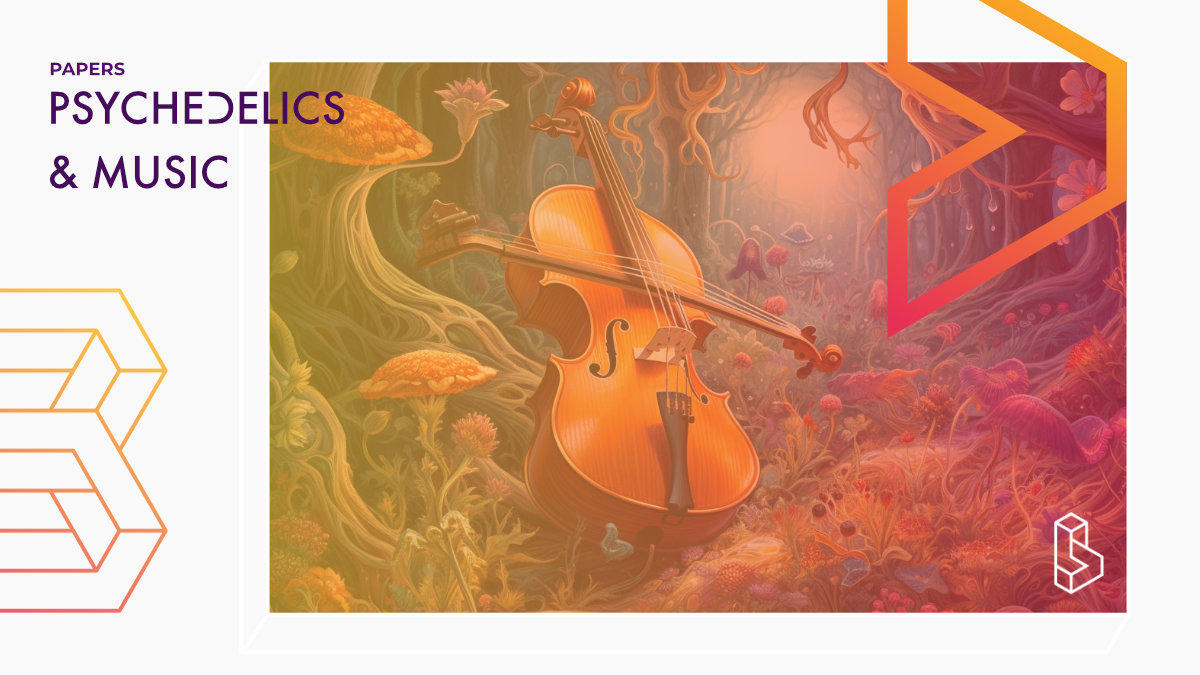This review (2018) finds that music may play a larger (active) role in psychedelic therapy and could be responsible for (part of the positive) outcomes.
Abstract of Psychedelics and music
“From the beginning of therapeutic research with psychedelics, music listening has been consistently used as a method to guide or support therapeutic experiences during the acute effects of psychedelic drugs. Recent findings point to the potential of music to support meaning-making, emotionality, and mental imagery after the administration of psychedelics, and suggest that music plays an important role in facilitating positive clinical outcomes of psychedelic therapy. This review explores the history of, contemporary research on, and future directions regarding the use of music in psychedelic research and therapy, and argues for more detailed and rigorous investigation of the contribution of music to the treatment of psychiatric disorders within the novel framework of psychedelic therapy.”
Authors: Frederick S. Barrett, Katrin H. Preller & Mendel Kaelen
Notes on Psychedelics and music
“Psychedelics and music listening interact to produce profound alterations in emotion, mental imagery, and personal meaning. Research is beginning to unveil underlying brain mechanisms, and to support a central role of music in psychedelic therapy. Music appears to influence the efficacy of therapy significantly, through modulating emotion, including the facilitating of mystical experiences, and through supporting autobiographical processes. Acknowledging the significance of music and the importance of rigorous future empirical investigations in this young field of research is key to improving our understanding of psychedelic therapies, and key to improving the efficacy of psychedelic therapies.”
- The paper explores the history of psychedelics and music, and the concurrence of them in traditional societies and research alike
- Already in 1972 music guidelines were set by Bonny and Pahnke (The use of music in psychedelic (LSD) psychotherapy)
- “These studies revealed that LSD alters the perception of the acoustic properties of music. In particular, LSD increased the BOLD signal in response to timbral complexity—indicative of the complexity of the music’s spectral distribution—in brain networks associated with music perception and emotion, i.e. the auditory cortices, inferior frontal gyrus (IFG), insula, precuneus, striatum, and the supplementary motor area.” … “an interaction between LSD and music lead to increased information flow (effective connectivity) from the parahippocampus towards the visual cortex, and this effect correlated with enhanced mental visual imagery and seeing autobiographical scenes.”
- Many different traits of music have been argued to be explain their emotional effects (from acoustic features to personal associations with a music piece)
- The paper also makes a link between being more emotionally involved with the music (and surrendering to that) and the mystical experiences (positively correlated) that are reported
- “It has been demonstrated that the music-experience during psychedelic therapy correlates with the occurrence of mystical experiences and insightfulness during psychedelic therapy, and with reductions in clinical symptoms 1 week after the session, and that calming effects of music are welcome and potentially beneficial during onset, ascent, and return phases of the psychedelic experience.”
- The authors imply that the music selection should be personal, and although standardisation has been good for scientific research, the therapeutic benefits could be enhanced by providing music with the best ‘personal resonance’.
- In the ‘future directions’ part of the review, the authors acknowledge that we don’t know the full effect of music and how it relates to other parts of psychedelic therapy (the talk therapy, therapist, set & settting, etc).
- One can finally note that the third author (Kaelen) was at the time of writing already working on a company that promotes the use of (generative) music for psychedelic experiences (Wavepaths).
Summary of Psychedelics and music
Music has been used in therapeutic research with psychedelics to guide or support therapeutic experiences. Recent findings suggest that music plays an important role in facilitating positive clinical outcomes of psychedelic therapy.
The history of music and psychedelic therapies
The earliest known musical instrument was a sophisticated bone flute, which dates back at least 35 000 years. Theories of the origins of music suggest that it evolved to support emotional communication, and may even have developed before more formal spoken language.
Find this paper
Psychedelics and music: neuroscience and therapeutic implications
https://doi.org/10.1080/09540261.2018.1484342
Open Access | Google Scholar | Backup | 🕊
Cite this paper (APA)
Barrett, F. S., Preller, K. H., & Kaelen, M. (2018). Psychedelics and music: neuroscience and therapeutic implications. International Review of Psychiatry, 30(4), 350-362.
Authors
Authors associated with this publication with profiles on Blossom
Frederick BarrettFrederick Streeter Barrett is an Assistant Professor of Psychiatry and Behavioral Sciences and works at the Johns Hopkins University Center for Psychedelic and Consciousness Research.
Katrin Preller
Katrin Preller is one of the upcoming researchers, currently at the University of Zurich and Yale University, and is focused on the neurobiology and pharmacology of psychedelics.
Mendel Kaelen
Mendel Kaelen is a neuroscientist and entrepreneur, researching and developing a new category of psychotherapeutic tools for care-seekers and care-providers. Mendel has researched the incomparable effects of music on the brain during LSD-assisted psychotherapy. His work has determined how LSD increases enhanced eyes-closed visual imagery, including imagery of an autobiographical nature. This gives light to how music can be used as another dimension in helping psychotherapists create the ideal setting for their patients.
Linked Research Papers
Notable research papers that build on or are influenced by this paper
Experience of Music Used With Psychedelic Therapy: A Rapid Review and ImplicationsMusic may help with the psychedelic experience, but not much attention has been paid to the specifics of the music used. This review (2020) looks at what music has been used and offers some tips on how to study it and use music in psychedelic therapy.

